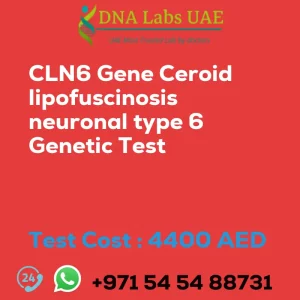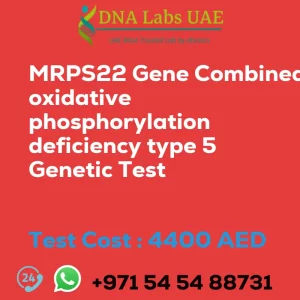VARS2 Gene Combined Oxidative Phosphorylation Deficiency Type 20 Genetic Test
At DNA Labs UAE, we offer the VARS2 Gene Combined Oxidative Phosphorylation Deficiency Type 20 Genetic Test. This test is designed to analyze an individual’s DNA sequence for specific genetic variations or mutations in the VARS2 gene.
Test Details
The VARS2 gene is responsible for encoding the enzyme valyl-tRNA synthetase 2, which plays a crucial role in protein synthesis. Mutations in this gene can lead to a condition called combined oxidative phosphorylation deficiency type 20. This condition affects the energy-producing centers of cells, known as mitochondria, and specifically impairs the oxidative phosphorylation process responsible for generating ATP.
Our NGS (Next-Generation Sequencing) technology allows us to identify any mutations or variations in the VARS2 gene that may be causing the combined oxidative phosphorylation deficiency type 20. This genetic test can be particularly useful in diagnosing individuals with symptoms suggestive of mitochondrial disorders, such as muscle weakness, exercise intolerance, developmental delays, or intellectual disabilities.
Test Components
- Price: 4400.0 AED
- Sample Condition: Blood or Extracted DNA or One drop Blood on FTA Card
- Report Delivery: 3 to 4 Weeks
- Method: NGS Technology
- Test Type: Metabolic Disorders
- Doctor: General Physician
- Test Department: Genetics
Pre-Test Information
Prior to undergoing the VARS2 Gene Combined Oxidative Phosphorylation Deficiency Type 20 Genetic Test, it is important to provide the clinical history of the patient. Additionally, a genetic counseling session may be conducted to draw a pedigree chart of family members affected by the combined oxidative phosphorylation deficiency type 20.
Importance of the Test
Identifying the specific genetic mutation in the VARS2 gene can provide valuable information for disease management, prognosis, and potential treatment options. This test can aid in the diagnosis of individuals with suspected mitochondrial disorders, allowing for appropriate medical interventions and support.
At DNA Labs UAE, we are committed to providing accurate and reliable genetic testing services. Contact us today to learn more about the VARS2 Gene Combined Oxidative Phosphorylation Deficiency Type 20 Genetic Test or to schedule an appointment.
| Test Name | VARS2 Gene Combined oxidative phosphorylation deficiency type 20 Genetic Test |
|---|---|
| Components | |
| Price | 4400.0 AED |
| Sample Condition | Blood or Extracted DNA or One drop Blood on FTA Card |
| Report Delivery | 3 to 4 Weeks |
| Method | NGS Technology |
| Test type | Metabolic Disorders |
| Doctor | General Physician |
| Test Department: | Genetics |
| Pre Test Information | Clinical History of Patient who is going for VARS2 Gene Combined oxidative phosphorylation deficiency type 20 NGS Genetic DNA Test A Genetic Counselling session to draw a pedigree chart of family members affected with Combined oxidative phosphorylation deficiency type 20 |
| Test Details |
The VARS2 gene is responsible for encoding the enzyme valyl-tRNA synthetase 2, which is involved in protein synthesis. Mutations in this gene can lead to a condition called combined oxidative phosphorylation deficiency type 20. Combined oxidative phosphorylation deficiency refers to a group of disorders that affect the energy-producing centers of cells, known as mitochondria. This type of deficiency specifically affects the oxidative phosphorylation process, which is responsible for generating ATP (the energy currency of cells) through the electron transport chain. NGS (Next-Generation Sequencing) genetic testing is a method used to analyze an individual’s DNA sequence for specific genetic variations or mutations. In the case of VARS2 gene testing, NGS can be used to identify any mutations or variations in the VARS2 gene that may be causing the combined oxidative phosphorylation deficiency type 20. This genetic test can be helpful in diagnosing individuals with symptoms suggestive of mitochondrial disorders, such as muscle weakness, exercise intolerance, developmental delays, or intellectual disabilities. Identifying the specific genetic mutation can provide important information for disease management, prognosis, and potential treatment options. |








